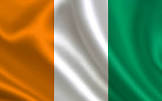Cote d’Ivoire, a multi-faith country with “42 percent Muslims and 30 percent Christians,” has enjoyed peaceful religious coexistence rarely seen in West Africa since independence.
This French-speaking country is exemplary in inter-religious relations, despite the jihadist threat closing in on its territory.
Six years after the Grand-Bassam (South) attack in March 2016, claimed by Al-Qaeda in the Islamic Maghreb (AQIM) as its handiwork, religious fundamentalism has not found a way to intrude into national life.
Like President Alassane Ouattara, who is Muslim but absolutely secular, the political class does not seek to interfere in cultural and religious affairs.
If the apprehension of interrogating this religious peace does not come from within Ivorian society itself, it is rather the regional environment of the country which provides worrisome auguries for the authorities.
In the north of the country, along the border with Burkina Faso, security forces remain vigilant over occasional incursions by jihadists seeking to gain a foothold on Ivorian soil.
Although attacks by these non-state forces have not been claimed, authorities and experts agree that they are attributable to the Macina katiba, an Al-Qaeda affiliate in the Sahel.
In Cote d’Ivoire, Muslims and Christians have lived side by side since the 19th century, this religious cohabitation being territorial with Islam predominant in the north and Christianity holding sway in the south.
Upon the country’s independence in 1960, the regime of President Felix Houphouet-Boigny, the first Ivorian head of state, chose religious freedom and secularism as the guiding principle of the country’s constitution.
Committed to inter-religious dialogue, the late Houphouet-Boigny established good relations with all denominations in Cote d’Ivoire, particularly with the Catholic Church, to which he belonged.
This vision gave rise to neutrality displayed by the state which prevented any commitment to a religious cause.
The state, through the Ivorian Interior Ministry, exercises a right of control and protection of religions.
Fighting the rise of radical Islam
Since the beginning of the 21st century, the country has experienced clashes, but religion has never been the real cause.
In 2011, when mosques were attacked and imams murdered during the post-election crisis, Cheick Boikary Fofana, then leader of the Muslim community, prevented the crisis from turning into a religious war by calling on the Muslim community to exercise restraint.
During the 2010 political crisis between the pro-Gbagbo military and the Republican Forces of Cote d’Ivoire, the major reason for the fighting was political and ethnic.
In March 2016, a few days after the Grand-Bassam attack, the president of the Episcopal Conference of Cote d’Ivoire, Bishop Alexis Touably, sent a message of peace and called on the population to avoid associating the attacks with Islam.
Today, though the security threat must be taken seriously, it is above all the rise in power of a “competing Islam,” coming from neighboring countries, that worries the Ivorian political and religious authorities.
Radical Islam tends to settle in remote areas of the Sahel region, where central governments exercise no real control over anything.
In response, President Alassane Ouattara and his government have been working closely with Muslim and Christian religious organizations for the past decade.
As a result, religious schools have been integrated into the national education system in exchange for public funding, in order to avoid funding from abroad.
The Supreme Council of Imams, Mosques and Islamic Affairs (COSIM), plays an indispensable role in preventing fundamentalism and promoting moderate Islam in the country.
To counter extremist religious discourse, COSIM organizes the training of Ivorian imams, selecting a hundred of them each year to be trained in Morocco, and broadcasts on the religious radio station Al Bayane, the most listened to in the country.
Propagated by Wahhabis from neighboring countries, puritanical Islam is hard at work trying to proscribe some local religious practices in order to impose its radical and univocal vision of Islam, reports Kong’s deputy mayor, Aboubacar Barro, a close ally of President Ouattara.
Wahhabis sought to ban the kouroubi, a traditional Malinke dance performed during Ramadan by topless young women.
In order to oppose this, the deputy mayor insisted that only the large mosque in this northern city may be open for the important Friday jumuah prayer.
This ensured the dissemination of a single religious doctrine and avoided any chance of splits.
Faith leaders strengthen religious alliance
Thanks to President Ouattara’s tireless efforts to promote social peace and reconciliation, interfaith dialogue continues to work well in Cote d’Ivoire.
Like Abidjan, which is marked by a strong mix of religions, Cote d’Ivoire can rely on one certainty: that religious cohabitation is the best weapon against terrorism.
Religious leaders have shown a firm commitment to establishing and maintaining a peaceful social climate, particularly between disparate religious communities.
In October 2021, the president of COSIM and his counterpart of the ‘Conference des Eveques Catholiques de Cote d’Ivoire’ (CECCI) reaffirmed the importance of working together to prevent conflict, particularly during election periods.
According to them, elections are periods of tension in society and it is necessary to take advantage of the current concord to strengthen the bonds between communities; an alliance that already exists in fact and in the charitable actions that the two religious organizations carry out on a daily basis across the country.
COSIM conducts numerous activities in the villages bordering Burkina Faso, Mali and Guinea.
A socio-cultural caravan organized in partnership with civil society organizations and Muslim youth associations, distributes food.
The Catholic Church is working to care for children who have lost their mothers at birth, and to improve the professional integration of young people through the organization of job search schemes.
The Ivorian religious communities are therefore very well established locally and act as indispensable actors in the mediation of inter-communal or ethnic conflicts.
This is a key point, because terrorist groups try to take advantage of these fragilities to establish themselves in West African countries.
AP/cgd/fss/as/APA


